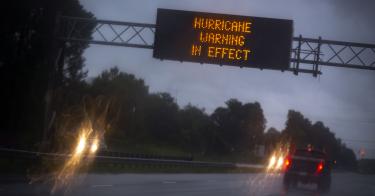Hurricane Florence pummeled the Carolinian coast, claimed 37 lives, and displaced hundreds of thousands of families from their homes. And to hear a lot of pundits tell it, humans are to blame and the Trump administration is doing nothing about it.
They have attributed this storm and the frequency of similar natural disasters to climate change and, by extension, the Trump administration’s climate policies.
Because of the president’s withdrawal from the Paris climate accords, which hasn’t officially even happened yet, and his proposed rollback of Obama-era fuel economy mandates, President Donald Trump is complicit in the ensuing devastation to the Carolinian coasts. The “never let a crisis go to waste” crowd is questioning whether this is our new “climate-change-fueled reality.”
What’s the real story? As climatologist Ryan Maue says, “Anyone trying to score political points after a natural disaster should take a deep breath and review the science first.” In fact, evidence from leading climatologists and the federal government’s National Oceanic and Atmospheric Administration demonstrates how climate change has little effect on the frequency of these disasters.
A study by the National Oceanic and Atmospheric Administration of the historical records of hurricane counts and sea surface temperatures since the late 1880s concluded that:
While global mean temperature and tropical Atlantic [sea and surface temperatures] show pronounced and statistically significant warming trends … the U.S. landfalling hurricane record … shows no significant increase or decrease … In short, the historical Atlantic hurricane record does not provide compelling evidence for a substantial greenhouse warming-induced long-term increase.
The agency’s Geophysical Fluid Dynamics Laboratory model also shows a“substantial decrease (~25 percent) in the overall number of Atlantic hurricanes and tropical storms with projected 21st century climate warming.”
Maue comes to a similar conclusion: “My own research, cited in a recent Intergovernmental Panel on Climate Change report, found that during the past half-century tropical storms and hurricanes have not shown an upward trend in frequency or accumulated energy. Instead they remain naturally variable from year-to-year.”
Over the last century, there have been no statistically significant trends in hurricane landfall. The frequency of these storms rose and fell at a natural rate disassociated with the rise in surface sea temperatures. Trump’s policies are no more likely to have “caused” Hurricane Florence or made it worse than President Barack Obama’s.
The evidence not only refutes claims that climate change causes more frequent hurricanes, it is conflicted on how climate change affects the intensity of these storms.
In the same National Oceanic and Atmospheric Administration report, scientists find that “While one of our modeling studies projects a large (~100%) increase in Atlantic category 4-5 hurricanes over the 21st century, we estimate that such an increase would not be detectable until the latter half of the century, and we still have only low confidence that such an increase will occur in the Atlantic basin … ”
Climatologist Cliff Mass, who studied the effects of climate change on Hurricane Harvey, puts the actual impact of warmer sea surface temperatures on storm intensity into perspective.
“Let us assume that all of the .5 °C warming of the Gulf was due to human-caused global warming … that NONE of it was natural,” he writes. “And that the air was warmed by the same amount … [this] implies an increase of 3.5 percent in the extreme precipitation of this storm. So for places that received 30 inches, perhaps 1 inch resulted from global warming. Not much. Immaterial regarding impacts or anything else.”
Unsurprisingly, last year’s string of hurricanes, and now Florence, have prompted aggressive policy action to combat climate change. Such proposed actions include the prohibition, restriction, and taxation of natural resources that emit carbon dioxide when burned.
In a recent interview, climate activist Bill McKibben said, “We know that we need to keep most of the coal and oil and gas that we know about underground if we have any hope of meeting the targets that everybody agreed to in Paris.”
Coal, oil, and natural gas are the abundant, affordable, and dependable energy sources that make the world go round. We light and heat our homes with them. We power our vehicles. They are critical to just about every component of life and have been instrumental in raising standards of living in the United States and around the world to the highest levels ever.
In fact, these natural resources have comprised at least 80 percent of the U.S. energy mix for more than a century. They’ve powered 80 percent of the entire world’s energy needs. Artificially restricting their use through taxes, regulations, and mandates are costly non-solutions that distract from more present-minded efforts to mitigate and adapt to the impacts of extreme weather.
Using the same climate sensitivity (the warming effect of a doubling of carbon dioxide emissions) as the Intergovernmental Panel on Climate Change assumes in its modeling, the world would be only 0.137 degrees Celsius cooler by 2100. Even if the entire industrialized world cut its carbon dioxide emissions entirely, the averted warming would amount to only 0.278 degrees Celsius by the turn of the century.
As thousands of our fellow Americans experience this terrible tragedy, no one is in a position to place blame on any one official or administration, nor use this catastrophe as a justification for their costly and ineffective climate policies.
Rather than attack one another over who is responsible for the latest disaster, let us instead commit our energy to helping the victims of Hurricane Florence and implementing the right policies to better protect and respond to future disasters.
This piece originally appeared in the Daily Signal




